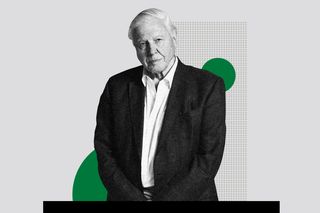
Why David Attenborough’s Environmentalism Is Flawed
The natural historian is a beloved figure in environmentalism — but his focus on overpopulation puts the onus of climate change on the poor.

The problem with David Attenborough’s politics is that he doesn’t profess any. And that turns into a problem for environmentalism itself.
In the last episode of Frozen Planet II, Attenborough left viewers with a solemn, final plea: “If we can do something about it, then do it. We can do it. We must do it. Then there will be a future for the planet.”
The naturalist is a beloved figure for his documentation of wildlife. Over the years, he’s built a platform showing the wonders of the Earth, and the richness of its biodiversity. In the process, he became instrumental in harboring many people’s love for the teeming abundance of life on our planet.
His documentary of the same name, Our Planet, does this — but also deviates from his earlier oeuvre, in that it is juxtaposed against frightening visuals of all the threats that close in on animals across the world. Viewers are shown numbers that directly correlate the rising human population with greater carbon and, consequently, more threats to wildlife. Herein lies the problem: Attenborough’s insistence on overpopulation as the biggest threat to the planet has the inadvertent consequence of blaming the poor who had little to do with it.
Population science has a racist genocidal history — and it’s been used to target the poor and marginalized with forced sterilization programs that have eugenicist undertones. Attenborough doesn’t espouse racism, but his longstanding position on population as the cause of climate change inadvertently carries this implicit assumption.
There are a few reasons why blaming overpopulation is flawed. First, countries with the highest population densities are also relatively poorer — and they contribute even less to global emissions than wealthier countries. Second, overconsumption contributes to a much higher environmental impact than population. Third, fossil fuel, plastic, and increasingly, tech industries are responsible for most emissions. But the world’s legal system is ill-equipped to hold multinational corporations accountable for their ecological crimes.
Related on The Swaddle:
The Pursuit of Wealth, Overconsumption Are Key Drivers in Climate Crisis, Scientists Warn
The unspoken rhetorical connotations of population are, however, actively dangerous. The intertwining of overpopulation with environmental degradation has already had devastating consequences. In 2019, a shooter cited concerns about population and immigration threatening the environment and targeted Mexicans in a mass shooting in El Paso. Later, a shooter in Christchurch, New Zealand described himself as an eco-fascist and targeted Muslims in another fatal mass shooting.
These are all political issues. But Attenborough didn’t start out as a political person, and consequently ended up with apolitical messaging about the crisis at hand. “I made natural history programs not because I was a rampaging proselytizer preaching about conservation… I like looking at animals and seeing what they do,” Attenborough himself told The Guardian. This was an approach that disappointed many, and frustrated attempts to get the mainstream media to care about the effects of carbon emissions and damage wrought by industries.
“Attenborough possesses irreproachable integrity, but his long silence on extinction and global warming in his television work has contributed towards a popular knowledge deficit,” environmentalists told The Guardian.
Then, when he did begin paying attention to humanity’s role in climate change, it began to be disproportionately leveled against the Global South — and has largely ignored the dangers of overemphasizing population as a threat to the planet. “The film’s focus on the apparent human mismanagement of natural resources is problematically predominantly in the Global South and in Asia — deforestation in Borneo, overfishing in Japan,” wrote Jerrine Tan in the LA Review of Books.
Moreover, global supply chains ensure that although the Global South is more highly populated than the Global North, much of what is produced in the former goes to the latter for consumption. “If Attenborough’s environmentalism has a coherent theme, it is shifting the blame from powerful forces on to either society in general or the poor and weak,” noted George Monbiot in The Guardian, adding that in 2013, Attenborough had said to the Telegraph “What are all these famines in Ethiopia? What are they about? They’re about too many people for too little land.”
Related on The Swaddle:
New Research Shows Why People in Power Tend To Justify Inequality
There remain significant questions one is left with at the end of Attenborough’s more recent programming. They end on an ambiguous note, directing viewers to a website to find out what they can do about the planet today. But the message belies the urgency of the situation: no single action by an individual will ever be enough unless we fundamentally change the way society is organized.
“Despite being billed as an unflinching look at the threats facing the intricate and endlessly fascinating ecosystems being depicted, it [Our Planet] actually tends to shy away from showing these threats or, even more importantly, addressing the question of what can be done to resolve them,” wrote Julia PG Jones, Professor of Conservation Science, Bangor University.
The fundamental issue, then, is that Attenborough employs his own gaze in scoping out the problem — and it’s one that carries all the blindspots of whiteness. It ignores how imperialism has destroyed indigenous knowledge systems, how militarism has destroyed livelihoods and landscapes in militarized places, and how global commerce dictates what is mined where, and how much.
There’s no doubt that Attenborough loves the planet and genuinely hopes to inspire change that will save it. Overwhelmingly, however, his focus on the population has shaped the mainstream narrative of what needs to be done. “Either we limit our population growth, or the natural world will do it for us,” he once said.
There are signs that he’s beginning to acknowledge the role of inequality — in a recent summit, he said that rich nations had a responsibility to tackle climate change given their contribution to it. But without a clear allegiance toward any one stance, the profoundly tragic visuals in Attenborough’s work end up being, as Tan puts it, “emotionally draining but politically empty.”
Rohitha Naraharisetty is a Senior Associate Editor at The Swaddle. She writes about the intersection of gender, caste, social movements, and pop culture. She can be found on Instagram at @rohitha_97 or on Twitter at @romimacaronii.
Related


Kerala Drops ‘Boys,’ ‘Girls’ From Public School Names
